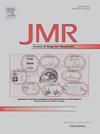Optimization of 15N–13C double-resonance NMR experiments under low temperature magic angle spinning dynamic nuclear polarization conditions
IF 1.9
3区 化学
Q3 BIOCHEMICAL RESEARCH METHODS
引用次数: 0
Abstract
Dynamic nuclear polarization (DNP) enhanced magic angle spinning (MAS) solid-state NMR carried out at 25 K enables rapid acquisition of multi-dimensional 13C–15N correlation spectra for protein structure studies and resonance assignment. Under commonly used DNP conditions, solvent deuteration reduces 1H–15N cross polarization (CP) efficiencies, necessitates more careful optimization, and requires longer high-power 15N radio-frequency pulses. The sensitivity of 2D heteronuclear correlation experiments is potentially impaired. Here we show that 2D 15N-13C experiments based on 13C-15N transferred echo double resonance (TEDOR) methods outperform 2D experiments based on CP transfers in a fully deuterated solvent, and are competitive with CP-based experiments when the solvent is only partially deuterated. Additionally, we show that optimization of TEDOR-based 2D experiments is simpler than optimization of CP-based experiments under 25 K MAS conditions.

低温魔角旋转动态核极化条件下 15N-13C 双共振核磁共振实验的优化。
在 25 K 温度下进行动态核偏振(DNP)增强型魔角旋转(MAS)固态核磁共振可快速获取多维 13C-15N 相关光谱,用于蛋白质结构研究和共振分配。在常用的 DNP 条件下,溶剂氘化会降低 1H-15N 交叉极化 (CP) 效率,因此需要进行更仔细的优化,并需要更长的高功率 15N 射频脉冲。二维异核相关实验的灵敏度可能会受到影响。在这里,我们展示了基于 13C-15N 转移回波双共振(TEDOR)方法的二维 15N-13C 实验优于在完全氚化溶剂中基于 CP 转移的二维实验,并且在溶剂仅部分氚化时与基于 CP 的实验具有竞争力。此外,我们还表明,在 25 K MAS 条件下,基于 TEDOR 的二维实验的优化比基于 CP 的实验的优化更简单。
本文章由计算机程序翻译,如有差异,请以英文原文为准。
求助全文
约1分钟内获得全文
求助全文
来源期刊
CiteScore
3.80
自引率
13.60%
发文量
150
审稿时长
69 days
期刊介绍:
The Journal of Magnetic Resonance presents original technical and scientific papers in all aspects of magnetic resonance, including nuclear magnetic resonance spectroscopy (NMR) of solids and liquids, electron spin/paramagnetic resonance (EPR), in vivo magnetic resonance imaging (MRI) and spectroscopy (MRS), nuclear quadrupole resonance (NQR) and magnetic resonance phenomena at nearly zero fields or in combination with optics. The Journal''s main aims include deepening the physical principles underlying all these spectroscopies, publishing significant theoretical and experimental results leading to spectral and spatial progress in these areas, and opening new MR-based applications in chemistry, biology and medicine. The Journal also seeks descriptions of novel apparatuses, new experimental protocols, and new procedures of data analysis and interpretation - including computational and quantum-mechanical methods - capable of advancing MR spectroscopy and imaging.

 求助内容:
求助内容: 应助结果提醒方式:
应助结果提醒方式:


